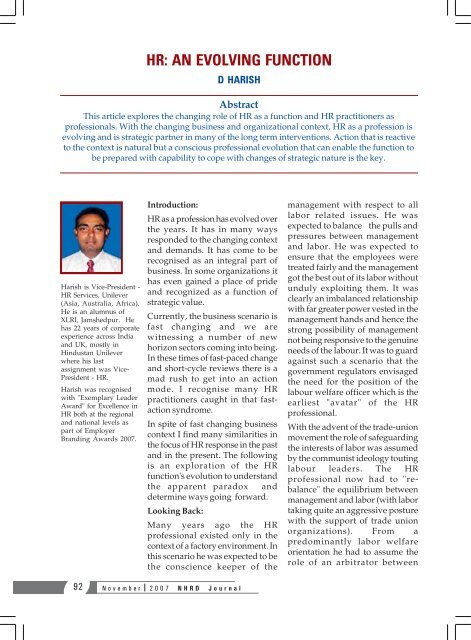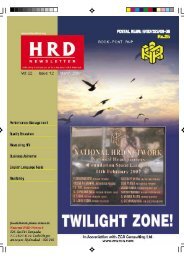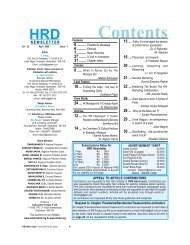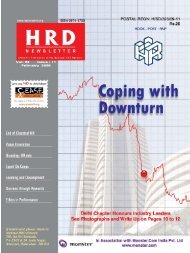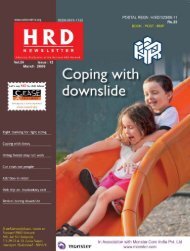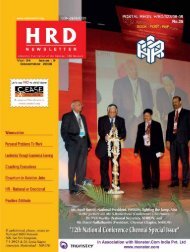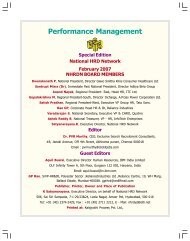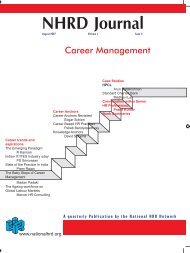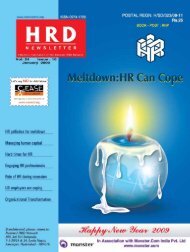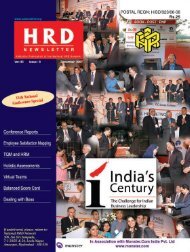NHRD Journal - National HRD Network
NHRD Journal - National HRD Network
NHRD Journal - National HRD Network
Create successful ePaper yourself
Turn your PDF publications into a flip-book with our unique Google optimized e-Paper software.
HR: AN EVOLVING FUNCTION<br />
D HARISH<br />
Abstract<br />
This article explores the changing role of HR as a function and HR practitioners as<br />
professionals. With the changing business and organizational context, HR as a profession is<br />
evolving and is strategic partner in many of the long term interventions. Action that is reactive<br />
to the context is natural but a conscious professional evolution that can enable the function to<br />
be prepared with capability to cope with changes of strategic nature is the key.<br />
Harish is Vice-President -<br />
HR Services, Unilever<br />
(Asia, Australia, Africa).<br />
He is an alumnus of<br />
XLRI, Jamshedpur. He<br />
has 22 years of corporate<br />
experience across India<br />
and UK, mostly in<br />
Hindustan Unilever<br />
where his last<br />
assignment was Vice-<br />
President - HR.<br />
Harish was recognised<br />
with "Exemplary Leader<br />
Award" for Excellence in<br />
HR both at the regional<br />
and national levels as<br />
part of Employer<br />
Branding Awards 2007.<br />
Introduction:<br />
HR as a profession has evolved over<br />
the years. It has in many ways<br />
responded to the changing context<br />
and demands. It has come to be<br />
recognised as an integral part of<br />
business. In some organizations it<br />
has even gained a place of pride<br />
and recognized as a function of<br />
strategic value.<br />
Currently, the business scenario is<br />
fast changing and we are<br />
witnessing a number of new<br />
horizon sectors coming into being.<br />
In these times of fast-paced change<br />
and short-cycle reviews there is a<br />
mad rush to get into an action<br />
mode. I recognise many HR<br />
practitioners caught in that fastaction<br />
syndrome.<br />
In spite of fast changing business<br />
context I find many similarities in<br />
the focus of HR response in the past<br />
and in the present. The following<br />
is an exploration of the HR<br />
function's evolution to understand<br />
the apparent paradox and<br />
determine ways going forward.<br />
Looking Back:<br />
Many years ago the HR<br />
professional existed only in the<br />
context of a factory environment. In<br />
this scenario he was expected to be<br />
the conscience keeper of the<br />
management with respect to all<br />
labor related issues. He was<br />
expected to balance the pulls and<br />
pressures between management<br />
and labor. He was expected to<br />
ensure that the employees were<br />
treated fairly and the management<br />
got the best out of its labor without<br />
unduly exploiting them. It was<br />
clearly an imbalanced relationship<br />
with far greater power vested in the<br />
management hands and hence the<br />
strong possibility of management<br />
not being responsive to the genuine<br />
needs of the labour. It was to guard<br />
against such a scenario that the<br />
government regulators envisaged<br />
the need for the position of the<br />
labour welfare officer which is the<br />
earliest "avatar" of the HR<br />
professional.<br />
With the advent of the trade-union<br />
movement the role of safeguarding<br />
the interests of labor was assumed<br />
by the communist ideology touting<br />
labour leaders. The HR<br />
professional now had to "rebalance"<br />
the equilibrium between<br />
management and labor (with labor<br />
taking quite an aggressive posture<br />
with the support of trade union<br />
organizations). From a<br />
predominantly labor welfare<br />
orientation he had to assume the<br />
role of an arbitrator between<br />
92<br />
November 2007 <strong>N<strong>HRD</strong></strong> <strong>Journal</strong>


